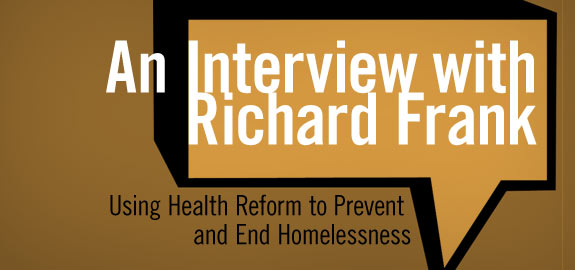The United States Interagency Council on Homelessness (USICH) interviews Richard Frank, Deputy Assistant Secretary for Planning and Evaluation at the Department of Health and Human Services. Secretary Frank discusses how health reform will offer new resources and opportunities to help end homelessness.

HRC is pleased to share the following article, originally published by the United States Interagency Council on Homelessness (USICH) and used with permission from the USICH.
Richard Frank is a Deputy Assistant Secretary for Planning and Evaluation at the Department of Health and Human Services. He directs the Office of Disability, Aging and Long-Term Care Policy, concerned with providing health care, long-term services, and supports and related services to a range of vulnerable populations, including those with severe and persistent mental disorders and those with substance use disorders. Prior to coming to HHS, Frank was the Margaret T. Morris Professor of Health Economics at Harvard Medical School. He is the co-author with Sherry Glied of the book Better But Not Well that reviews U.S. mental health policy since 1950. He is a member of the Institute of Medicine.
USICH: In what ways will the Affordable Care Act’s expansion of Medicaid help end chronic homelessness?
There are a number of provisions in the Affordable Care Act that offer opportunities to provide services and supports for people who are chronically homeless. Central among those are the expansion of the Medicaid program to cover people with incomes under 133% of the poverty standard. This will enable uninsured, single, childless adults who are disproportionately represented in the chronically-homeless population gain access to a range of health and behavioral health services. The ACA also allows states new options for coordinating care for low-income populations with multiple chronic conditions and severe mental disorders, through the health homes options. Coordination of health, behavioral health and human services is critical to evidence-based supportive housing arrangements. Other ACA provisions enable states to organize and pay for evidence-based behavioral health treatments that have been shown to be successful in treating and supporting chronically homeless people in the community through the so-called 1915i waiver provisions (Supported Employment and Assertive Community Treatment). There are also provisions that support great integration of health and behavioral health care through Federally Qualified Health Centers and community behavioral health organizations.
USICH: How will it help address family and youth homelessness?
The financial protections offered to families through coverage expansions and subsidies for insurance will enhance economic security and provide access to health care to adults and children in low-income households. In addition, the ACA contains provisions that aim to provide targeted support to sub-groups that are particularly at risk for homelessness (for example, young adults aging out of foster care).
USICH: There are many new demonstration programs coming under health reform. What should states and homeless advocates & services providers be paying attention to?
One key thrust in the provisions around delivery system reform involves efforts to coordinate care for populations with complex health, human service, and long-term services and support needs. These include the health home initiative mentioned earlier, the patient-centered medical home, the Independence at Home demonstration (a home visitation program for frail elderly people), the behavioral health integration demonstration, and new efforts to coordinate care for people who are dually-eligible for Medicare and Medicaid. Each of these efforts can serve as important elements of modern supportive housing efforts.
